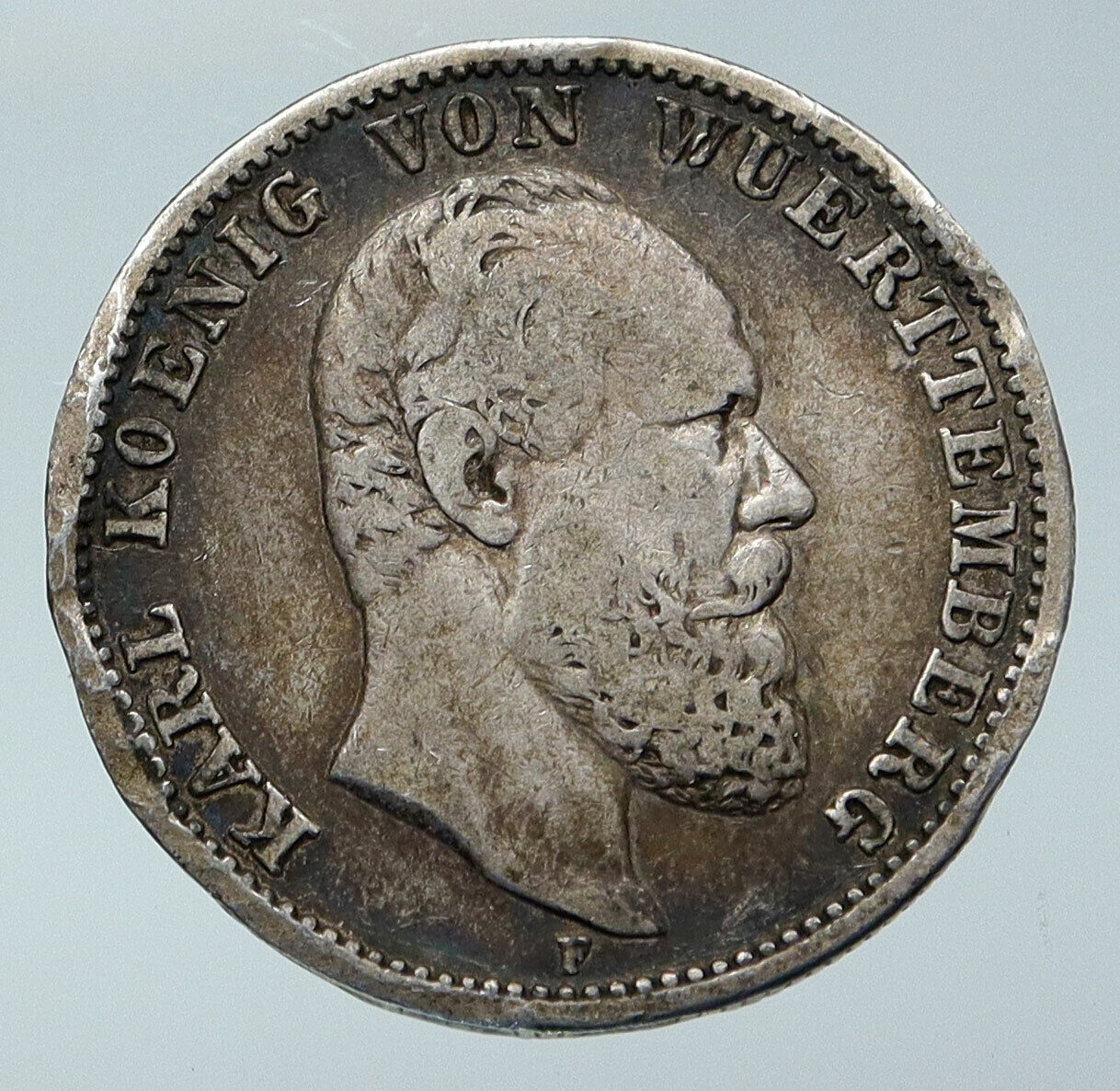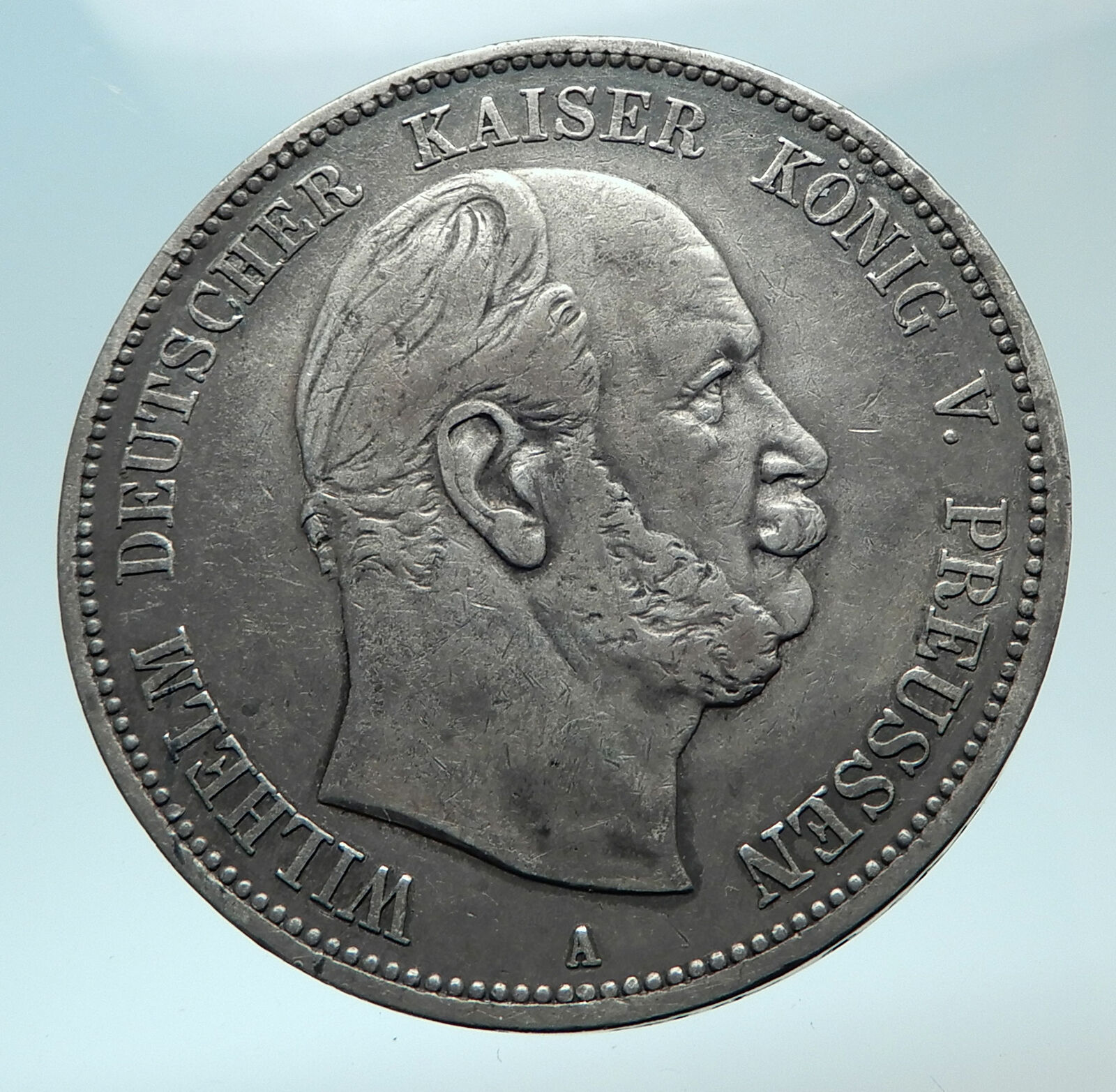|
Germany. German States. Kingdom of Bavaria
Maximilian IV, as Maximilian I, Joseph – King: 1806-1825
1816 Silver Thaler (Krone / Kronentaler) 39mm (29.47 grams) 0.868 Silver (0.8188 oz. ASW)
Reference: KM # 706.1
Certification: NGC XF DETAILS 2845342-010
MAXIMILIANUS IOSEPHUS BAVARIAE REX, Bare head of the king right.
PRO DEO ET POPULO around crossed scepter and shield with crown at center above; 1816. below.
Edge Lettering: BAIERISCHER KRONTHALER
You are bidding on the exact item pictured, provided with a Certificate of Authenticity and Lifetime Guarantee of Authenticity.
 Maximilian I Joseph (27 May 1756 – 13 October 1825) was Duke of Zweibr?ken from 1795 to 1799, Prince-Elector of Bavaria (as Maximilian IV Joseph) from 1799 to 1806, then King of Bavaria (as Maximilian I Joseph) from 1806 to 1825. He was a member of the House of Palatinate-Birkenfeld-Zweibr?ken, a branch of the House of Wittelsbach. Maximilian I Joseph (27 May 1756 – 13 October 1825) was Duke of Zweibr?ken from 1795 to 1799, Prince-Elector of Bavaria (as Maximilian IV Joseph) from 1799 to 1806, then King of Bavaria (as Maximilian I Joseph) from 1806 to 1825. He was a member of the House of Palatinate-Birkenfeld-Zweibr?ken, a branch of the House of Wittelsbach.
The new King of Bavaria was the most important of the princes belonging to the Confederation of the Rhine, and remained Napoleon’s ally until the eve of the Battle of Leipzig, when by the Treaty of Ried (8 October 1813) he made the guarantee of the integrity of his kingdom the price of his joining the Allies. On 14 October, Bavaria made a formal declaration of war against Napoleonic France. The treaty was passionately backed by Crown Prince Ludwig and by Marshal von Wrede.
By the first Treaty of Paris (3 June 1814), however, he ceded Tyrol to Austria in exchange for the former Grand Duchy of W?zburg. At the Congress of Vienna, which he attended in person, Maximilian had to make further concessions to Austria, ceding Salzburg and the regions of Innviertel and Hausruckviertel in return for the western part of the old Palatinate. The king fought hard to maintain the contiguity of the Bavarian territories as guaranteed at Ried but the most he could obtain was an assurance from Metternich in the matter of the Baden succession, in which he was also doomed to be disappointed.
At Vienna and afterwards Maximilian sturdily opposed any reconstitution of Germany which should endanger the independence of Bavaria, and it was his insistence on the principle of full sovereignty being left to the German reigning princes that largely contributed to the loose and weak organization of the new German Confederation. The Federative Constitution of Germany (8 June 1815) of the Congress of Vienna was proclaimed in Bavaria, not as a law but as an international treaty. It was partly to secure popular support in his resistance to any interference of the federal diet in the internal affairs of Bavaria, partly to give unity to his somewhat heterogeneous territories, that Maximilian on 26 May 1818 granted a liberal constitution to his people. Montgelas, who had opposed this concession, had fallen in the previous year, and Maximilian had also reversed his ecclesiastical policy, signing on 24 October 1817 a concordat with Rome by which the powers of the clergy, largely curtailed under Montgelas’s administration, were restored.
The new parliament proved to be more independent than he had anticipated and in 1819 Maximilian resorted to appealing to the powers against his own creation; but his Bavarian “particularism” and his genuine popular sympathies prevented him from allowing the Carlsbad Decrees to be strictly enforced within his dominions. The suspects arrested by order of the Mainz Commission he was accustomed to examine himself, with the result that in many cases the whole proceedings were quashed, and in not a few the accused dismissed with a present of money.
Maximilian died at Nymphenburg Palace, in Munich, on 13 October 1825 and was succeeded by his son Ludwig I. Maximilian is buried in the crypt of the Theatinerkirche in Munich.
  Germany, officially the Federal Republic of Germany is a federal parliamentary republic in western-central Europe. It includes 16 constituent states and covers an area of 357,021 square kilometres (137,847 sq mi) with a largely temperate seasonal climate. Its capital and largest city is Berlin. With 81 million inhabitants, Germany is the most populous member state in the European Union. After the United States, it is the second most popular migration destination in the world. Germany, officially the Federal Republic of Germany is a federal parliamentary republic in western-central Europe. It includes 16 constituent states and covers an area of 357,021 square kilometres (137,847 sq mi) with a largely temperate seasonal climate. Its capital and largest city is Berlin. With 81 million inhabitants, Germany is the most populous member state in the European Union. After the United States, it is the second most popular migration destination in the world.
Various Germanic tribes have occupied northern Germany since classical antiquity. A region named Germania was documented before 100 CE. During the Migration Period the Germanic tribes expanded southward. Beginning in the 10th century, German territories formed a central part of the Holy Roman Empire. During the 16th century, northern German regions became the centre of the Protestant Reformation.
The rise of Pan-Germanism inside the German Confederation resulted in the unification of most of the German states in 1871 into the Prussian-dominated German Empire. After World War I and the German Revolution of 1918-1919, the Empire was replaced by the parliamentary Weimar Republic. The establishment of the Third Reich in 1933 led to World War II and the Holocaust. After 1945, Germany split into two states, East Germany and West Germany. In 1990, the country was reunified.
 In the 21st century, Germany is a great power and has the world’s fourth-largest economy by nominal GDP, as well as the fifth-largest by PPP. As a global leader in several industrial and technological sectors, it is both the world’s third-largest exporter and importer of goods. Germany is a developed country with a very high standard of living sustained by a skilled and productive society. It upholds a social security and universal health care system, environmental protection and a tuition free university education. In the 21st century, Germany is a great power and has the world’s fourth-largest economy by nominal GDP, as well as the fifth-largest by PPP. As a global leader in several industrial and technological sectors, it is both the world’s third-largest exporter and importer of goods. Germany is a developed country with a very high standard of living sustained by a skilled and productive society. It upholds a social security and universal health care system, environmental protection and a tuition free university education.
Germany was a founding member of the European Union in 1993. It is part of the Schengen Area, and became a co-founder of the Eurozone in 1999. Germany is a member of the United Nations, NATO, the G8, the G20, and the OECD. The national military expenditure is the 9th highest in the world. Known for its rich cultural history, Germany has been continuously the home of influential artists, philosophers, musicians, sportsmen, entrepreneurs, scientists and inventors.
|









 Maximilian I Joseph (27 May 1756 – 13 October 1825) was Duke of Zweibr?ken from 1795 to 1799, Prince-Elector of Bavaria (as Maximilian IV Joseph) from 1799 to 1806, then King of Bavaria (as Maximilian I Joseph) from 1806 to 1825. He was a member of the House of Palatinate-Birkenfeld-Zweibr?ken, a branch of the House of Wittelsbach.
Maximilian I Joseph (27 May 1756 – 13 October 1825) was Duke of Zweibr?ken from 1795 to 1799, Prince-Elector of Bavaria (as Maximilian IV Joseph) from 1799 to 1806, then King of Bavaria (as Maximilian I Joseph) from 1806 to 1825. He was a member of the House of Palatinate-Birkenfeld-Zweibr?ken, a branch of the House of Wittelsbach.
 Germany, officially the Federal Republic of Germany is a federal parliamentary republic in western-central Europe. It includes 16 constituent states and covers an area of 357,021 square kilometres (137,847 sq mi) with a largely temperate seasonal climate. Its capital and largest city is Berlin. With 81 million inhabitants, Germany is the most populous member state in the European Union. After the United States, it is the second most popular migration destination in the world.
Germany, officially the Federal Republic of Germany is a federal parliamentary republic in western-central Europe. It includes 16 constituent states and covers an area of 357,021 square kilometres (137,847 sq mi) with a largely temperate seasonal climate. Its capital and largest city is Berlin. With 81 million inhabitants, Germany is the most populous member state in the European Union. After the United States, it is the second most popular migration destination in the world. In the 21st century, Germany is a great power and has the world’s fourth-largest economy by nominal GDP, as well as the fifth-largest by PPP. As a global leader in several industrial and technological sectors, it is both the world’s third-largest exporter and importer of goods. Germany is a developed country with a very high standard of living sustained by a skilled and productive society. It upholds a social security and universal health care system, environmental protection and a tuition free university education.
In the 21st century, Germany is a great power and has the world’s fourth-largest economy by nominal GDP, as well as the fifth-largest by PPP. As a global leader in several industrial and technological sectors, it is both the world’s third-largest exporter and importer of goods. Germany is a developed country with a very high standard of living sustained by a skilled and productive society. It upholds a social security and universal health care system, environmental protection and a tuition free university education.




